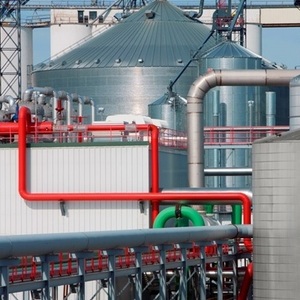Siemens Energy to electrify biorefinery in Germany




SOURCE: UPM-Kymmene
June 28, 2021
BY Siemens Energy
The Finnish company UPM-Kymmene selected Siemens Energy to supply electrification, automation, and digitalization (EAD) packages for a next-generation biorefinery currently under construction in Leuna, Germany.
The biorefinery will be the first industrial-scale facility of its type ever built. It will apply novel process innovations to sustainably convert 100 percent wood into biobased mono-ethylene glycol (MEG), mono-propylene glycol (MPG) as well as renewable functional fillers (RFF). Both MEG, MPG as well as functional fillers have traditionally been produced using fossil-based raw materials. UPM will provide alternatives to considerably reduce the CO2 footprint of end-products such as PET bottles, packaging materials, textiles, or rubber products used in various automotive applications. Siemens Energy’s scope of supply for the project includes:
•Electrification: mill-wide medium- and low-voltage power distribution system and drive system (motor control center, variable speed drives, motors)
•Automation: Distributed control system (DCS) for multiple process areas and remote I/O cubicles (total of 9,000 process objects), including safety and ATEX functions for explosive atmospheres
Advertisement
•Digitalization: Complete digital twin for the entire plant, covering the mill’s whole life cycle – from integrated engineering to integrated operation.
The Leuna Biorefinery will be a big step for UPM to expand its business into wood-based biomolecular products and solutions.
“We are confident that the bio-based mono-ethylene glycol, mono-propylene glycol, and renewable functional fillers made in Leuna will meet the strong demand of customers and end-users looking to change towards a truly sustainable portfolio,” said Juuso Konttinen, Vice President UPM Biochemicals. “By implementing Siemens Energy’s digitalization solutions and digital twin, we can help ensure safe and efficient operations.”
Advertisement
The biorefinery is scheduled for start-up in late 2022. When fully operational, it will have a total annual capacity of 220,000 tons.
“As a global leader in industrial decarbonization, we are proud to be selected as a trusted partner and facilitator for this groundbreaking project,” said Jennifer Hooper, Senior Vice President, Industrial Applications Solutions for Siemens Energy. “We look forward to helping UPM reduce the world’s reliance on chemicals produced from fossil fuels as we move toward creating a more sustainable world.”
Related Stories
The U.S. Department of Energy Bioenergy Technologies Office (BETO) announced up to $23 million in funding to support research and development (R&D) of domestic chemicals and fuels from biomass and waste resources.
The U.S. DOE has announced its intent to issue funding to support high-impact research and development (R&D) projects in two priority areas: sustainable propane and renewable chemicals and algal system cultivation and preprocessing.
Sens. Sherrod Brown, D-Ohio, and Pete Ricketts, R-Neb., in August introduced the Renewable Chemicals Act, a bill that aims to create a tax credit to support the production of biobased chemicals.
The Chemical Catalysis for Bioenergy Consortium, a consortium of the U.S. DOE’s Bioenergy Technologies Office, has launched an effort that aims to gather community input on the development of new biomass processing facilities.
USDA on March 8 celebrated the second annual National Biobased Products Day, a celebration to raise public awareness of biobased products, their benefits and their contributions to the U.S. economy and rural communities.
Upcoming Events










